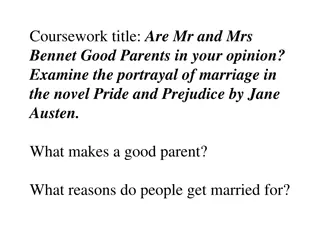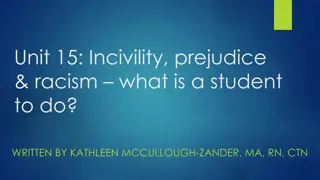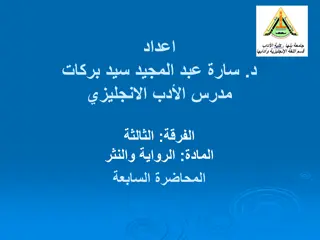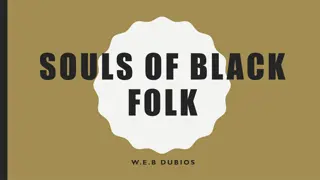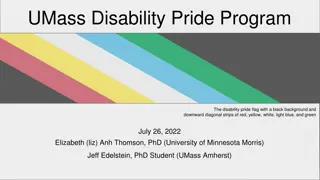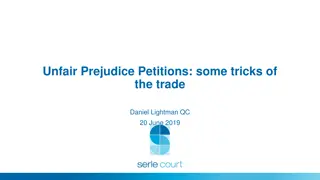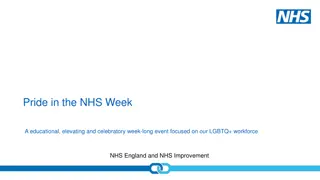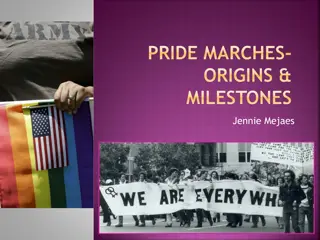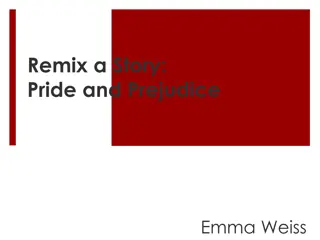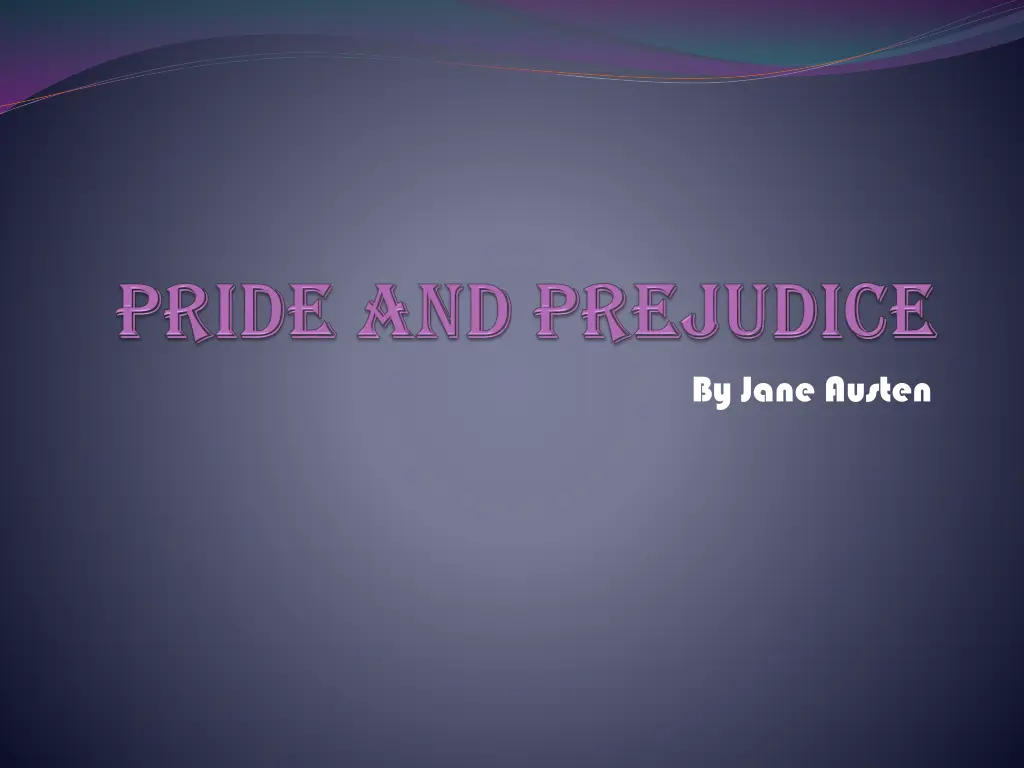
Critique of Marriage Norms in Jane Austen's Works
Explore the use of irony in Jane Austen's writings critiquing societal norms, particularly regarding advantageous marriages in the 19th century English society. Delve into themes of gender stereotypes, societal expectations, and the significance of reputation and marriage choices.
Download Presentation

Please find below an Image/Link to download the presentation.
The content on the website is provided AS IS for your information and personal use only. It may not be sold, licensed, or shared on other websites without obtaining consent from the author. If you encounter any issues during the download, it is possible that the publisher has removed the file from their server.
You are allowed to download the files provided on this website for personal or commercial use, subject to the condition that they are used lawfully. All files are the property of their respective owners.
The content on the website is provided AS IS for your information and personal use only. It may not be sold, licensed, or shared on other websites without obtaining consent from the author.
E N D
Presentation Transcript
1. Irony is the use of language in a way that expresses the opposite of its literal meaning. Examples of irony in the text. It is a truth universally acknowledged that a single man in possession of good fortune must be in want of a wife . This is a satirical line filled with irony. Its literal meaning is that a rich single man should certainly be looking for a wife . If we consider though Austen s attitude about society s expectations for women, we realize that this is not in fact her own personal idea but only a view fixed in the minds of the people of that period, which in fact criticisesthrough her work. It could even bear the reverse meaning, that is a single woman must be looking for a husband, especially a wealthy one .
2. How does the author criticise the society of that era? Compare that society with contemporary society. Make a chart outlining these differences. Mrs Bennet, a foolish and fussy gossip, is the sort who agrees with the novel s opening words: It is a truth universally acknowledged that a single man in possession of a good fortune must be in want of a wife. She sees Bingley s arrival as an opportunity for one of the girls to obtain a wealthy spouse
You may discuss: the centrality of advantageous marriage as a fundamental social value of that period. In 19th English society, single women s options used to be extremely limited, and socially prescribed, of course. So, women s potential and efforts had to be focused on a desperate pursuit of a husband in possession of good fortune , as their only means of a secure future; a preoccupation which Austen perceived as absurd, since it only reduced the role of women to that of subservient wives. the male dominant society of the period and the inequalities arisen as a result. the importance of holding a good reputation in 19th century English society. marrying for love vs marrying for money, status and security
He has no interest in women who are slighted by other men. Bingley, cheerful and sociable, has an excellent time and is taken with Jane; Darcy, cleverer but less tactful, finds people dull and even criticizes Jane for smiling too often. Elizabeth decides that her sister is very much in love with him but conceals it very well. Elizabeth says it is better for a young woman to be patient until she is sure of her feelings. You may discuss: gender stereotypes, especially about the set of ideas that society used to hold about women. Women were expected to dress, behave and present themselves in a certain way in order to be socially accepted and respected Her refusal only increases his admiration, and he considers that were it not for the inferiority of her connections, he should be in some danger.
You may discuss: Social division and inequality. 19th century England was highly stratified with class divisions based on wealth and family connections. The upper class in this established and rigid social hierarchy was usually prejudiced against people who belonged to lower social groups, since according to their assumptions/stereotypes they had very poor breeding, misbehaved and had low value as persons. For this reason, they would avoid intermingling with them, irrespective of emotions or inner goodness, for fear of being insulted or embarrassed.
6. Read the definitions of the words pride and prejudice provided by "Oxford" and "Collins" dictionaries. Work in pairs to do the tasks below, drawing on information provided in the summary of the first chapters: a. Decide which character shows pride and which one shows prejudice in the novel, according to the definitions. Justify your answers with specific examples from the text. Mrs Bennett shows prejudice because she insists that her daughters should marry a wealthy man (A). Darcy is mainly associated with pride because he thinks that he is too important to dance with Elizabeth, whom he finds not attractive enough at first. He also shows prejudice because he does not want to dance with anyone not rich enough or well-bred (B). (G). Then, she continues being prejudiced against him and refuses to acknowledge his feelings for
Elizabeth is mainly associated with prejudice against Darcy which derives from his behaviour towards her. That is why she refuses his invitation to dance her until he regrets his behaviour. Elizabeth also shows pride, in the first sense of the word, because she is proud of her family and her background; that is why her feelings are hurt by Darcy s attitude towards her (B). Miss Bingley, who is in love with Darcy, is prejudiced against Elizabeth because she sees her as a rival; that is why she keeps criticising her and her family s background (G)
Darcy - Bingley Darcy Bingley refuses to dance with Elizabeth characterises her as tolerable but not handsome enough to tempt him declares he has no interest in women slighted by other men B finds people dull accuses Jane of smiling too often C admits he feels resentment for people F does not seem to exhibit either of the two
Elizabeth Jane Elizabeth refuses to dance with Darcy D accuses Darcy of having a propensity to hate everybody F refuses to dance with Darcy again G Jane does not seem to exhibit either of the two
Although the setting and characters of the novel are out of date, Pride and Prejudice has remained a popular novel since its publication in 1813. Why do you think it has retained its popularity? The novel seems old-fashioned but it deals with a major issue in literature, pure and unconditional love which overcomes social barriers and all kinds of prejudice. It is still relevant today because despite social and technological advances, human nature seems not to change that easily. It also criticizes the hypocrisy of the British society of the time and it shows the idleness of well-off people, who do nothing else but attending balls, rendering long visits, travelling, playing music and hunting. Therefore, its social message still holds true today although in a lesser extent.
Besides, the novel evokes our curiosity (or even nostalgia) about a world which is now outdated (at least in developed countries and in big cities), where social boundaries are very strict, where everyone is meticulously monitored , criticized, frowned upon, even condemned sometimes, but where, on the other hand, everybody seems to have their own specific place in society. Furthermore, it provides readers with an interesting insight on the status of women in Europe in the 19th century. Women were considered to be inferior and every woman who exhibited some kind of independent behaviour would be severely criticized. Last but not least, it is fun to read, not to mention that it offers readers a happy ending!
b. Make a list of the elements or values in the novel that you believe are universal. Do they transcend time? Make a poster and present it to your classmates comparing each other s findings. Love, friendship, independence, sincerity, discretion, compassion, understanding, equality, boldness, integrity, self-confidence, wittiness, self-determination etc. c. Do you think that Elizabeth Bennetwould still be considered a remarkable woman in modern-day society? What qualities does she have which may be significant for a young lady nowadays? Elizabeth seems to be independent, intelligent and bold/daring, not being afraid to express her opinion openly. She does show prejudice, but only after being insulted by Darcy. She is proud of herself and of her family and she is not dazzled by fortune or social status, unlike her mother and many other women of her time. She also seems to be a good judge of other people s character despite the fact that she can be very strict at times. She is probably aware of the fact that she is charming but she is far from conceited. All these traits are positive, so Elizabeth would certainly be considered a remarkable woman even today.
8. Read the opening line of the novel (which has become a famous quotation since) and work in groups to answer the questions. a. Which two themes are revealed in the opening line? Marriage and money/ wealth/ social status or men s and women s position in society b. How are individuals defined? Which is the status of women in Regency England, namely in the early 19th century? They are defined by their fortune, their social status and their gender. Women have a clearly inferior social status compared to that of men because they are regarded as complements to male status and not as individuals with their own needs and personalities.
c. The gossipy small town environment is a microcosm of society at large. What do you think about Jane Austen s perspective on society as a whole? What conclusion can you draw about Jane Austen s perspective on the society of that era? Jane Austen is critical and occasionally ironical towards the society of her time, which was established or structured on the basis of class, money and gender. Social behaviour was regarded as a very important aspect and it was thus closely observed, imposing strong limits on individuals, particularly women. The author shows people who are constantly being watched and criticised by others, both in public and family occasions, which could mean that she wanted to portray the lack of independence that people, and especially women, at her time used to have. Moreover, Austen s choice to present characters from different social and/or economical backgrounds who fall in love with each other, perhaps shows her intention to criticize or even reject the values of her society.
How does Darcy see people living in Meryton? He considers them as being inferior to him b. How do you characterise him? What kind of behaviour does he display? He can be described as arrogant, snobbish, conceited, prejudiced, socially pretentious and completely dependent on status when judging people or making friends. c. What is his impression of Elizabeth? He thinks that she is insignificant, inferior to him. He judges her only by her physical appearance and jumps into conclusions. ----------------------------------------------------------------------------------- a. Which word best describes Darcy s way of making the first marriage proposal to Elizabeth? Arrogant/ conceited b. How does Elizabeth behave and react with reference to the title of the novel? She is very proud of herself and she cannot forget the way Darcy has treated her at the beginning of the novel. She is now absolutely prejudiced against him and she disapproves of his every move and opinion.
c. Can you guess about the impact of Elizabeths behaviour on Darcy? How should he behave from now on? He must be very upset because we know that he has started having feelings for Elizabeth, which grew so tense that he finally proposed to her. He should try to convince her that he has changed and that he does not judge people based on their social background but rather on their merit/ personality. He should also try to be less arrogant and aloof and to show his real feelings. d. Does Elizabeth pay any attention to his behaviour or his aristocratic standing? Elizabeth judges him only on the basis of his behaviour towards her and her family and not on his aristocratic background. -----------------------------------------------------------------------------------------
a. Which words show that Elizabeth has shown narrow-mindedness? Despicably, vanity, useless or blameablemistrust, wretchedly blind, my folly, prepossession, ignorance, driven reason away. b. Has she recognised her faults? How has her judgment been affected by her pride and prejudice? Her lament shows that she has clearly and unequivocally recognisedher faults and has regretted making them. She has been too proud and prejudiced to see that Darcy has changed and that he really loves, admires and respects her. c. c. Do you think she feels humiliated when admitting her feelings to Darcy? Probably yes, because she is very proud and independent and it is difficult for her to acknowledge her mistakes. On the other hand, she is honest, intelligent and bold, which means that she prefers admitting her feelings than concealing them.
a. a. Has Darcy acknowledged that his class prejudice had clouded his judgment about Elizabeth? How is Has Darcy acknowledged that his class prejudice had clouded his judgment about Elizabeth? How is this revealed in the text? this revealed in the text? Yes, he has and this is revealed by the fact that he admits to being selfish and having compared others only to his own (social) worth. He blames his upbringing for that as his parents have always urged him to care for nobody but himself and his circle. He also admits being humbled by Elizabeth and having been taught a lesson by her. b. What is his opinion about a person's manner and his or her social status? Which words reveal b. What is his opinion about a person's manner and his or her social status? Which words revealthis opinion opinion? He has been taught that he is superior to people with a lower social status to his but now, thanks to Elizabeth, he has learned to behave differently. His initial opinions are revealed by words like pride , conceit , spoilt , selfish , overbearing , insufficient , pretensions think meanly of all the rest of the world. this c. Has his upbringing affected his behaviour? c. Has his upbringing affected his behaviour?
His upbringing is definitely responsible for his behaviour. Being an only son for too long he became spoilt by his parents, despite their good intentions and the fact that they gave him good principles. d. Explain how the above quotation reveals Darcy's journey to self d. Explain how the above quotation reveals Darcy's journey to self- -discovery. Having in mind that self Having in mind that self- -actualisers actualisersaccept their own human nature with all its accept their own human nature with all its flaws, how can it be characterised as a self flaws, how can it be characterised as a self- -actualisation He admits his own mistakes and flaws and he seems to have sincerely regretted his past behaviour. He also seems to be eager to change and become the man Elizabeth needs and deserves to have by her side. Her behaviour made him realise what a mistake it was to care only about the superficial and not the essential. e. Do you think that achieving a level of self e. Do you think that achieving a level of self- -awareness leads to one s future happiness? Is future happiness determined by self happiness? Is future happiness determined by self- -awareness only? discovery. actualisationclimax? climax? awareness leads to one s future awareness only?
Task 9 Task 9 - -p.99 answers answers ----------------------------------------------------------------------------------------------------------------------------- -------------------------------------------------------------------------------------------------------------------------------- ------------ ----------------------------------------------------------------------------------------------------------------------------- -------------------------------------------------------------------------------------------------------------------------------- ------ --- d. Is class consciousness a characteristic of society in Greece? How is our society structured? d. Is class consciousness a characteristic of society in Greece? How is our society structured? Probably yes, but to a far lesser extent than in Great Britain, where class division is reflected even in the way people talk (especially as far as pronunciation is concerned). e. Can you spot any similarities or differences between current social e. Can you spot any similarities or differences between current social behaviours in the novel? Which are they? in the novel? Which are they? Even today in some parts of the world women have an inferior position and less rights than men; some people judge others on the basis of their social status rather than their personal qualities. However, in modern, socially developed societies, women and men have equal status, opportunities and rights. Furthermore, in the modern world, individuals are not so closely watched as in Jane Austen s time. p.99- -Work in groups and discuss the following topics. Decide on a. b. c. and give your own Work in groups and discuss the following topics. Decide on a. b. c. and give your own --------- behavioursand the ones depicted and the ones depicted
f. Name some characteristic social values of the 21st century f. Name some characteristic social values of the 21st century society. society. Freedom, equality (of rights and opportunities), democracy, social rights, emancipation, financial security, independence, respect, dignity, religious tolerance, freedom of thought, beliefs and expression. g. Which words in the summary and extracts you have read so far reflect the importance that Austen places on the family educating its children? Draw a comparison with our own society. Women in Austen s time were not expected to get any education. As Austen ironically puts it in the opening line, women were just expected to land a wealthy husband, while it was only men who would receive an education. But Austen's sarcasm ridicules this mentality.
Another example, reflecting the importance Austen places on education, is Darcy s reasoning for refusing to dance with Elizabeth. He says that he wouldn t dance with anyone not rich enough and well bred. he wouldn t dance with anyone not rich enough and well bred. That means that only people who received an education were worthy of other people s respect. So, Austen is actually saying that education makes people cultured and socially accepted. Finally, Darcy admits that he was given good principles, as his rich parents obviously provided him with a good education. His education was instrumental in making him a well- mannered man. In modern societies in developed countries, a significant percentage of women receives a university education. This proves the importance contemporary societies place on education in creating cultured, well-rounded individuals.

